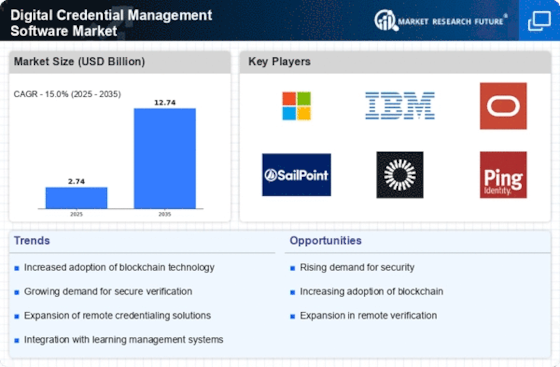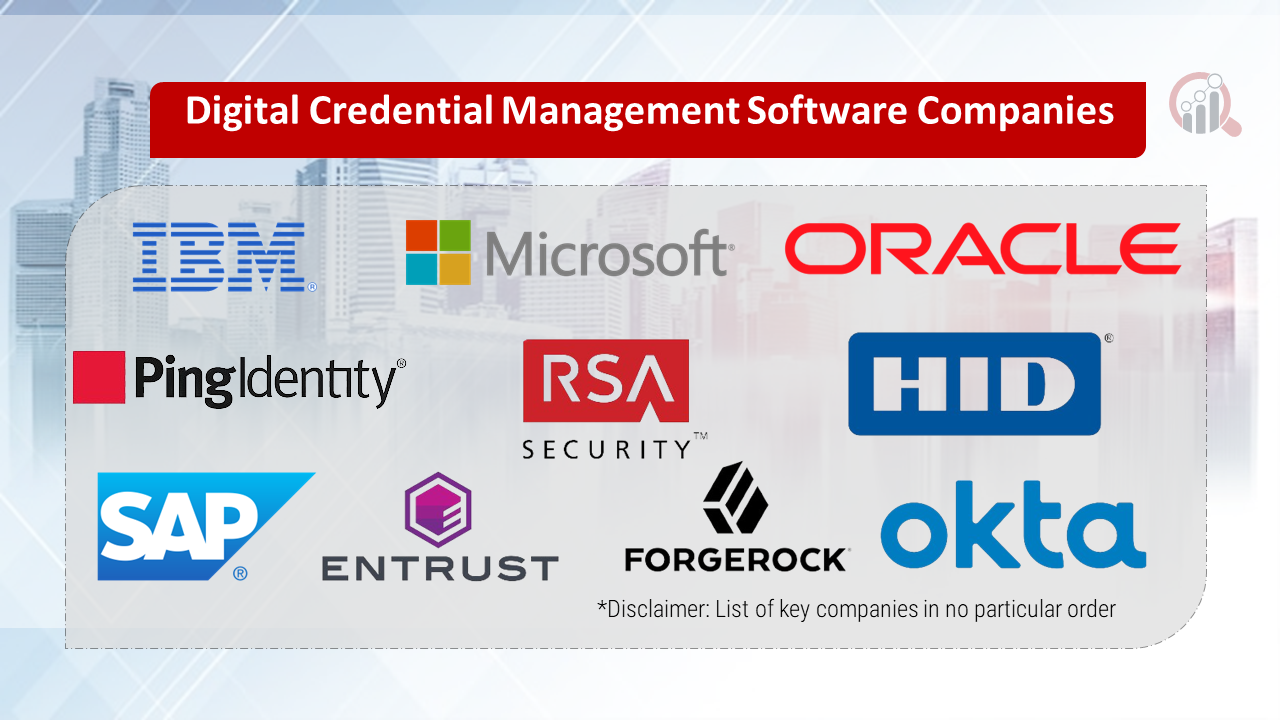Top Industry Leaders in the Digital Credential Management Software Market
Competitive Landscape of Digital Credential Management Software Market
The digital credential management software market is experiencing significant growth, driven by the rising need for secure access control, increasing cyber threats, and the wider adoption of cloud-based solutions. This expanding market fosters a competitive environment where established players vie for market share with innovative newcomers.
Key Players:
- IBM Corporation
- Microsoft Corporation
- Oracle Corporation
- SAP SE
- RSA Security LLC
- Okta, Inc.
- Ping Identity Corporation
- ForgeRock, Inc.
- Entrust Datacard Corporation
- HID Global Corporation
Strategies Adopted:
-
Product Innovation: Leading companies are constantly innovating their offerings. This includes expanding functionalities like integrations with learning management systems (LMS) for education, or blockchain integration for tamper-proof credentials. -
Focus on Security: Robust security features are paramount. Multi-factor authentication, encryption, and access controls are crucial differentiators in a market where data breaches can be devastating. -
User Experience: User-friendly interfaces and intuitive workflows are essential for both credential issuers and holders. Streamlined credential issuance and verification processes enhance user adoption. -
Compliance: Adherence to industry standards and regulations is critical. This fosters trust and ensures compatibility with existing systems. -
Strategic Partnerships: Collaboration with industry leaders, learning platforms, and professional associations can significantly expand a company's reach and market share.
Factors for Market Share Analysis:
-
Market reach: The number of customers a company serves across different industries and regions. -
Product Features: The breadth and depth of functionalities offered by the software solution. -
Deployment options: Whether the software is cloud-based, on-premise, or offers a hybrid model for deployment flexibility. -
Customer service: The quality and responsiveness of technical support and user training programs. -
Pricing Model: Cost-effectiveness and flexible pricing structures tailored to different customer needs.
New and Emerging Companies:
The digital credential management software market is attracting new entrants with innovative solutions. These companies often focus on niche areas like blockchain-based credentials or micro-credentials for specific skill sets.
Examples of Emerging Players:
-
Learning Machine: Specializes in verifiable credentials for the learning and development domain. -
Credo: Offers a platform for issuing and managing achievement badges specifically designed for the creative industries. -
Sovrin Foundation: Develops infrastructure for self-sovereign identity, empowering individuals to control their credentials.
Current Company Investment Trends:
Companies are actively investing in research and development to enhance their offerings. This includes exploring emerging technologies like blockchain and artificial intelligence to further secure and streamline credential management. Additionally, there's a growing focus on interoperability, allowing seamless exchange of digital credentials across different platforms. Mergers and acquisitions are also on the rise, as established players seek to expand their product portfolios and regional reach.
Latest Company Updates:
-
Security Concerns Drive Adoption: The increasing number of cyberattacks is prompting organizations to prioritize robust credential management. Digital credential management software offers features like multi-factor authentication and secure storage to mitigate these risks
-
Integration with Learning Management Systems: Digital credential management platforms are integrating with Learning Management Systems (LMS) to streamline the process of issuing and tracking certifications earned through online courses
-
Security Concerns Drive Adoption: The growing awareness of cybersecurity threats is a major driver for the market. Organizations are increasingly recognizing the need for robust credential management to protect their digital assets. Digital credential management software offers features like multi-factor authentication and privileged access management to bolster security











